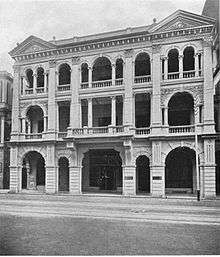Nationale Handelsbank
The Nationale Handelsbank was a Dutch bank that was established to financing trade between the Netherlands and the Dutch East Indies. After operating independently for nearly a hundred years, the parts in Indonesia, were nationalized by the Indonesian government. The remainder was acquired by the Rotterdamsche Bank in 1960 and would be absorbed into AMRO Bank.[1]
| Industry | Financial services |
|---|---|
| Fate | part nationalized and part acquired |
| Predecessor | Netherlands India Commercial Bank |
| Successor | Ultimate successors Bank Mandiri and ABN AMRO |
| Founded | 1863 |
| Defunct | 1960 |
| Headquarters | Amsterdam, Netherlands |
| Products | Commercial banking and Retail banking |

As Nederlandsch-Indische Handelsbank
In 1863 Nederlandsch-Indische Handelsbank (English: Netherlands India Commercial Bank), which would later become Nationale Handelsbank, was established in order to finance and deal with trade between the Netherlands and the Dutch East Indies. A Dutch colony that consisted of what is now Republic of Indonesia. The banks head office, located in Amsterdam, was where its branches outside of the Dutch East Indies reported to. Whereas, the branches within the Dutch colony reported to the main office in Jakarta.
Between 1901 and 1950, Netherlands India Commercial Bank opened and closed various branches in countries outside of the Netherlands and Dutch East Indies. In 1901 it opened a branch in Singapore. Which until 1914 contained the main port for smaller vessels going between it and ports in the Dutch East Indies. The bank also established a branch in Hong Kong in 1906. A location that before World War 1 was a major transshipment point for raw sugar going from the Dutch East Indies to refineries in Britain. In 1920 the bank opened branches in Bombay, Calcutta, Shanghai, and Kobe to aid in cotton trading with Japan. From 1921 to 1923 branches where opened in the Japanese prefectures of Tokyo and Yokohama. Additional branches were also opened in the Chinese provinces of Amoy and Swatou. Although, in 1924 the branch in Yokohama closed after the Kanto earthquake of 1923 and the Chinese branch in Swatou closed after operating for only a few years. The bank continued expanding in the 1930 and 1940s though. In 1938 a new branch was opened in Manila and in 1948 it established a branch in Bangkok to aid with the rice, tea, shellac trades. Around 1948 the branches in China closed after the defeat of the Kuomintang government.

As Nationale Handelsbank
- 1950: The bank changed its name to Nationale Handelsbank. It closed the branch in Manila, which had enjoyed a brief boom after World War II but now was no longer promising.
- 1952: The branch in Kobe was still functioning but it closed sometime thereafter.
- 1953: By this time the bank had branches throughout Indonesia in Java (Bandoeng, Banjoewangi*, Gambir (Weltevreden), Malang, Probolinggo, Samarang, Soerabaja, Tegal*, and Tjirebon*), Soematra (Djambi, Medan, Palembang, Telok-Betoeng), Bandjarmasin, Pontianak, and Macassar. The branches marked with * dealt with warehousing and shipping matters. Prior to the Japanese invasion in 1942, the bank had also maintained branches at Pasoeroean, Tjilatjap, Pekalongan, Menado, Tandjoengbalai, and Gorontalo.
- 1953: The bank established Mercantile Bank of Canada, with offices in Montreal, Quebec, Canada.[2]
- 1959: The Indonesian government nationalized the bank’s local operations to create Bank Umum Negara.
- 1960: Rotterdamsche Bank acquired Nationale Handelsbank.
- 1962: Rotterdamsche Bank sold Nationale Handelsbank’s branches in Bangkok, Hong Kong, Singapore, and Tokyo to Chase Manhattan Bank.
- 1963: Nationale Handelsbank sold 50% of Mercantile Bank to Citibank.
- 1965: Nationale Handelsbank sold the remaining 50% of Mercantile Bank to Citibank, giving rise to the “Mercantile Bank Affair”. Nationale Handelsbank also changed its name to Nationale Bank voor Middellang Krediet (National Bank for Medium-Term Credit).
- 1967: Nationale Bank voor Middellang Krediet was absorbed into AMRO Bank which would become ABN AMRO.
| Wikimedia Commons has media related to Nederlandsch-Indische Handelsbank. |
References
- "ABN AMRO History". ABN AMRO History Department. Retrieved 14 July 2010.
- "Mercantile Bank of Canada". The Canadian Encyclopedia.